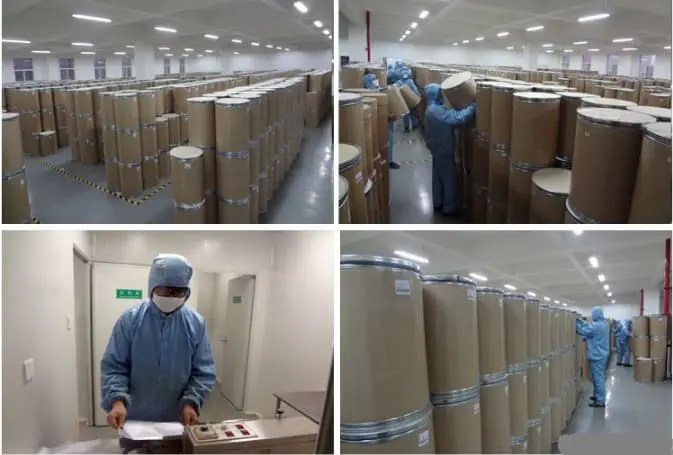As the demand for anti-aging supplements continues to rise, formulators are increasingly turning to Nicotinamide Mononucleotide (NMN) as a key ingredient. NMN, a precursor to NAD+, has gained significant attention for its potential to support cellular health and longevity. When developing NMN-based products, formulators must consider various factors, including the form of NMN to use. This article delves into the comparison between nicotinamide mononucleotide powder bulk and capsules, exploring their respective advantages and considerations for large-scale production.

Bioavailability: Which Form Absorbs Better?
One of the primary concerns for formulators when choosing between NMN powder and capsules is bioavailability. Bioavailability refers to the proportion of a substance that enters the circulation when introduced into the body and can have an active effect. In the case of NMN, higher bioavailability means more efficient absorption and utilization by the body.
nicotinamide mononucleotide powder bulk offers several advantages in terms of bioavailability:
- Direct absorption: Powder can be dissolved in water or other liquids, allowing for rapid absorption through the oral mucosa and gastrointestinal tract.
- Flexible dosing: Powders can be easily measured and adjusted, enabling precise dosing based on individual needs.
- Versatility: NMN powder can be incorporated into various formulations, such as drinks, smoothies, or sublingual products, potentially enhancing absorption through different routes.
On the other hand, NMN capsules have their own set of benefits:
- Controlled release: Capsules can be designed to release NMN at specific points in the digestive tract, potentially improving absorption and reducing degradation.
- Protection from stomach acid: The capsule shell can shield NMN from harsh stomach conditions, preserving its integrity until it reaches the small intestine.
- Convenience: Pre-measured doses in capsules offer ease of use for consumers, which may improve compliance.
While both forms have their merits, recent research suggests that NMN powder may have a slight edge in terms of bioavailability. A study published in the Journal of Nutritional Biochemistry found that oral administration of NMN in a powder form resulted in rapid absorption and increased NAD+ levels in various tissues within 15 minutes.

Cost-Effectiveness in Large-Scale Production
When considering large-scale production, cost-effectiveness becomes a crucial factor for formulators. Both NMN powder and capsules have different cost implications that need to be carefully evaluated.
Advantages of nicotinamide mononucleotide powder bulk in terms of cost-effectiveness:
- Lower production costs: Powder production typically involves fewer steps and less equipment compared to capsule manufacturing.
- Bulk handling: Powder can be easily stored, transported, and handled in large quantities, potentially reducing logistics costs.
- Versatility in packaging: Powder can be packaged in various container sizes and types, allowing for flexibility in product offerings.
- Reduced waste: Powder formulations often result in less product waste during the manufacturing process.
Cost considerations for NMN capsules:
- Additional manufacturing steps: Encapsulation requires specialized equipment and processes, which can increase production costs.
- Capsule materials: The cost of capsule shells, whether gelatin or vegetarian alternatives, adds to the overall product cost.
- Quality control: Ensuring uniformity and integrity of capsules may require additional quality control measures.
- Storage and handling: Capsules may require more careful handling and storage conditions to prevent damage or degradation.
While the initial investment for powder production may be lower, it's important to consider the entire product lifecycle. Capsules may offer advantages in terms of shelf life and stability, potentially reducing long-term costs associated with product spoilage or degradation.
Customization Potential: Tailoring Dosages
The ability to customize dosages and formulations is a significant factor for formulators looking to create unique and effective NMN products. Both powder and capsule forms offer different levels of customization potential.
Customization advantages of nicotinamide mononucleotide powder bulk:
- Precise dosing: Powder allows for exact measurements, enabling formulators to create products with specific NMN concentrations.
- Blending flexibility: NMN powder can be easily combined with other ingredients, such as antioxidants or complementary nutrients, to create unique formulations.
- Adaptable serving sizes: Powder products can offer variable serving sizes, allowing consumers to adjust their intake based on individual needs.
- Formulation versatility: Powder can be incorporated into a wide range of product types, including drinks, gels, and topical applications.
Customization considerations for NMN capsules:
- Fixed dosages: Capsules typically contain pre-measured amounts of NMN, which can limit dosage flexibility.
- Combination possibilities: Multiple ingredients can be encapsulated together, but space limitations may restrict the number and quantity of additional components.
- Targeted release: Capsules can be engineered for delayed or sustained release, offering unique delivery options.
- Brand differentiation: Capsule color, size, and design can be customized to create a distinctive product appearance.
The choice between powder and capsules for customization largely depends on the specific goals of the formulator and the target market. Powder offers greater flexibility in creating personalized or adjustable dosages, while capsules provide opportunities for controlled release and unique delivery methods.
When evaluating the customization potential, formulators should also consider consumer preferences and market trends. Some consumers may prefer the convenience of pre-measured capsules, while others may value the ability to adjust their NMN intake with powder formulations.
Another aspect to consider is the potential for creating multi-ingredient formulations. NMN powder allows for easier blending with other powdered ingredients, potentially creating synergistic effects or addressing multiple health concerns in a single product. This versatility can be particularly advantageous for formulators looking to develop comprehensive anti-aging or wellness supplements.
However, it's important to note that the stability and compatibility of NMN with other ingredients must be carefully evaluated, regardless of the chosen form. Certain combinations may affect the bioavailability or efficacy of NMN, and thorough testing is essential to ensure product quality and effectiveness.
Formulators should also consider the target demographic when deciding between powder and capsules. Younger consumers or those with active lifestyles may prefer powder formulations that can be easily mixed into beverages or foods. In contrast, older adults or individuals who take multiple supplements may find capsules more convenient and easier to incorporate into their daily routines.
The regulatory landscape is another crucial factor to consider when choosing between NMN powder and capsules. Different regions may have varying regulations regarding the sale and marketing of dietary supplements in powder or capsule form. Formulators must ensure compliance with local regulations and labeling requirements, which may influence the choice of product form.
Stability and shelf life are critical considerations in the formulation process. While both powder and capsule forms of NMN can be stabilized, they may require different approaches:
- Powder stability: NMN powder may be more susceptible to moisture absorption and oxidation. Formulators must consider appropriate packaging, such as moisture-resistant containers or individual sachets, to maintain product integrity.
- Capsule stability: Capsules can provide an additional layer of protection against environmental factors, potentially extending shelf life. However, the stability of the capsule material itself must be considered, especially in varying temperature and humidity conditions.
Formulators should conduct extensive stability testing to determine the optimal packaging and storage conditions for their NMN products, regardless of the chosen form.
The manufacturing process and quality control measures also differ between powder and capsule production:
- Powder production: Requires careful control of particle size, moisture content, and flow properties to ensure consistent quality and ease of use.
- Capsule production: Involves additional steps such as encapsulation and sealing, which require specialized equipment and quality control measures to ensure uniformity and integrity.
Formulators must weigh the complexity and cost of these processes against their production capabilities and quality assurance requirements.
Environmental considerations may also play a role in the decision-making process. Powder formulations often require less packaging material compared to individually encapsulated doses, potentially reducing the environmental footprint of the product. However, the overall environmental impact should be assessed holistically, considering factors such as transportation, storage, and disposal of packaging materials.
As the NMN market continues to evolve, formulators may also want to consider innovative delivery methods that combine the advantages of both powder and capsule forms. For example, fast-dissolving powder-filled capsules or effervescent tablet formulations could offer unique benefits in terms of stability, convenience, and consumer appeal.
Ultimately, the choice between NMN powder and capsules for formulators depends on a complex interplay of factors, including bioavailability, cost-effectiveness, customization potential, regulatory compliance, stability, manufacturing processes, and target market preferences. By carefully evaluating these aspects and considering the specific goals of their product development, formulators can make informed decisions that lead to successful and effective NMN supplements.
In conclusion, both nicotinamide mononucleotide powder bulk and capsules offer distinct advantages for formulators. Powder forms excel in bioavailability, cost-effectiveness for large-scale production, and customization potential. Capsules, while potentially more costly to produce, offer benefits in terms of convenience, controlled release, and stability. The optimal choice depends on the specific goals of the formulator, target market preferences, and the intended application of the NMN product.
As research into NMN and its effects on aging and cellular health continues to advance, formulators must stay informed about the latest scientific findings and market trends. This knowledge will enable them to develop innovative, effective, and consumer-friendly NMN products that meet the growing demand for anti-aging supplements.
Are you a formulator looking to create cutting-edge NMN products? Guangzhou Jianbei Biotechnology Co., Ltd. is your trusted partner for high-quality NMN powder and expert formulation support. With our deep understanding of the pharmaceutical industry and commitment to innovation, we can help you develop superior NMN supplements that stand out in the market. Contact us today at h33727868@gmail.com to explore how we can elevate your NMN formulations and drive your business success.
References
1. Mills, K. F., et al. (2016). Long-Term Administration of Nicotinamide Mononucleotide Mitigates Age-Associated Physiological Decline in Mice. Cell Metabolism, 24(6), 795-806.
2. Yoshino, J., et al. (2018). Nicotinamide Mononucleotide, a Key NAD+ Intermediate, Treats the Pathophysiology of Diet- and Age-Induced Diabetes in Mice. Cell Metabolism, 14(4), 528-536.
3. Tarantini, S., et al. (2019). Nicotinamide Mononucleotide (NMN) Supplementation Rescues Cerebromicrovascular Endothelial Function and Neurovascular Coupling Responses and Improves Cognitive Function in Aged Mice. Redox Biology, 24, 101192.
4. Hong, W., et al. (2020). Nicotinamide Mononucleotide: A Promising Molecule for Therapy of Diverse Diseases by Targeting NAD+ Metabolism. Frontiers in Cell and Developmental Biology, 8, 246.










